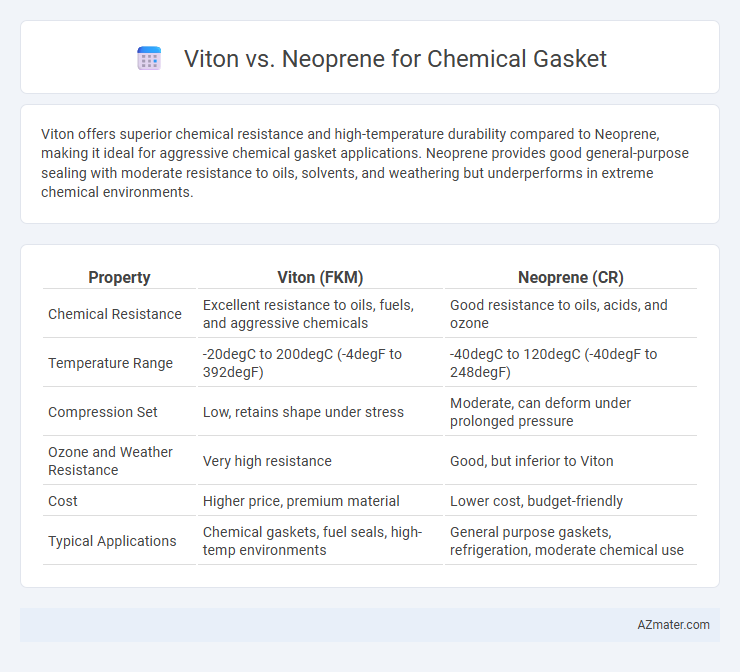Viton offers superior chemical resistance and high-temperature durability compared to Neoprene, making it ideal for aggressive chemical gasket applications. Neoprene provides good general-purpose sealing with moderate resistance to oils, solvents, and weathering but underperforms in extreme chemical environments.
Table of Comparison
| Property | Viton (FKM) | Neoprene (CR) |
|---|---|---|
| Chemical Resistance | Excellent resistance to oils, fuels, and aggressive chemicals | Good resistance to oils, acids, and ozone |
| Temperature Range | -20degC to 200degC (-4degF to 392degF) | -40degC to 120degC (-40degF to 248degF) |
| Compression Set | Low, retains shape under stress | Moderate, can deform under prolonged pressure |
| Ozone and Weather Resistance | Very high resistance | Good, but inferior to Viton |
| Cost | Higher price, premium material | Lower cost, budget-friendly |
| Typical Applications | Chemical gaskets, fuel seals, high-temp environments | General purpose gaskets, refrigeration, moderate chemical use |
Introduction to Viton and Neoprene Gaskets
Viton gaskets, made from fluorocarbon elastomers, exhibit exceptional chemical resistance, high temperature tolerance up to 200degC, and durability against aggressive solvents, acids, and fuels, making them ideal for harsh chemical environments. Neoprene gaskets, composed of chloroprene rubber, offer good resistance to oils, refrigerants, and moderate chemicals, with temperature tolerance typically up to 120degC and excellent flexibility and weather resistance. Choosing between Viton and Neoprene depends on specific chemical exposure, temperature requirements, and mechanical demands in gasket applications.
Chemical Resistance: Viton vs Neoprene
Viton offers superior chemical resistance compared to Neoprene, excelling in handling aggressive chemicals such as acids, oils, fuels, and solvents, making it ideal for harsh industrial environments. Neoprene provides moderate chemical resistance but can degrade when exposed to strong acids, alkalis, and certain oils, limiting its use in highly corrosive or solvent-rich applications. Choosing Viton for chemical gaskets ensures enhanced durability and longevity in demanding chemical exposure conditions.
Temperature Tolerance and Performance
Viton gaskets offer superior temperature tolerance, maintaining stability between -15degC to 205degC and withstanding intermittent peaks up to 250degC, making them ideal for high-heat chemical applications. Neoprene gaskets perform well within a narrower temperature range of -40degC to 120degC, providing good resistance to moderate heat but lacking Viton's high-temperature endurance. In chemical environments requiring sustained high-temperature exposure, Viton delivers enhanced durability and chemical resistance, outperforming Neoprene in longevity and sealing integrity.
Durability and Longevity Comparison
Viton gaskets exhibit superior chemical resistance and high-temperature durability, maintaining elasticity and sealing capability in aggressive environments up to 200degC. Neoprene offers moderate chemical resistance and good weathering durability, suitable for less extreme conditions but tends to degrade faster under prolonged exposure to oils and solvents. The longevity of Viton in chemical gasket applications significantly outperforms Neoprene due to its resistance to aging, oxidation, and thermal breakdown, making it ideal for long-term, demanding chemical sealing tasks.
Common Chemical Gasket Applications
Viton gaskets excel in applications requiring resistance to aggressive chemicals such as acids, oils, and solvents, making them ideal for use in the automotive, chemical processing, and petroleum industries. Neoprene gaskets are commonly utilized in applications involving moderate exposure to oils, refrigerants, and weathering, often found in refrigeration systems, construction, and marine environments. Both materials offer durable sealing solutions, but Viton's superior chemical resistance suits more demanding chemical gasket applications.
Flexibility and Mechanical Properties
Viton gaskets exhibit superior chemical resistance and higher temperature tolerance, making them ideal for aggressive environments but tend to be less flexible compared to neoprene. Neoprene gaskets offer excellent flexibility and moderate mechanical strength, performing well under dynamic stress and providing good resilience in applications requiring repeated flexing. When prioritizing flexibility combined with adequate mechanical properties, neoprene is often preferred, whereas Viton is chosen for harsher chemical exposure and durability.
Cost Analysis: Viton vs Neoprene
Viton offers superior chemical resistance and durability but comes with a higher upfront cost compared to Neoprene, which is more budget-friendly for less demanding applications. Neoprene gaskets provide adequate performance in mild chemical environments, making them cost-effective for short-term or low-exposure uses. Evaluating the total cost of ownership reveals Viton's longer lifespan and reduced replacement frequency can offset its initial price in aggressive chemical settings.
Environmental and Safety Considerations
Viton gaskets offer superior chemical resistance and high-temperature tolerance, making them ideal for hazardous environments with exposure to aggressive chemicals and extreme heat. Neoprene gaskets provide good resistance to oils, ozone, and weathering but may degrade when exposed to strong acids or solvents, potentially compromising safety in harsh chemical applications. Environmental safety concerns favor Viton due to its stability and lower emissions of harmful substances during use, while Neoprene's chlorine content can lead to more toxic byproducts upon disposal or incineration.
Maintenance and Replacement Factors
Viton gaskets exhibit superior chemical resistance and longer service life compared to Neoprene, reducing maintenance frequency in harsh environments. Neoprene gaskets, while more cost-effective initially, tend to degrade faster under exposure to oils and solvents, leading to more frequent replacements. Choosing Viton significantly lowers downtime and maintenance costs due to its enhanced durability and resistance to chemical degradation.
Choosing the Right Gasket Material
Selecting the right gasket material between Viton and Neoprene depends on chemical compatibility and temperature resistance. Viton excels in resisting aggressive chemicals like oils, acids, and solvents, making it ideal for harsh chemical environments, while Neoprene offers good resistance to moderate chemicals, weathering, and ozone exposure. For applications requiring superior chemical resistance and high-temperature tolerance up to 200degC, Viton gaskets provide a longer-lasting, more reliable seal compared to Neoprene, which is better suited for less demanding conditions with temperatures up to 120degC.

Infographic: Viton vs Neoprene for Chemical gasket
 azmater.com
azmater.com